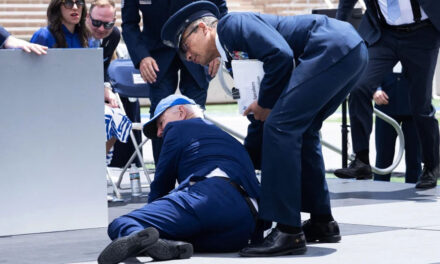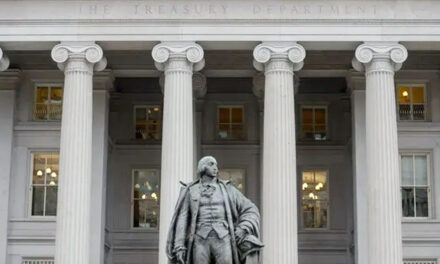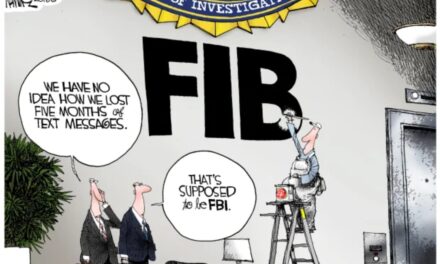
HORIST: What good is the strongest military on earth?
The foundation of all diplomacy is a powerful military. It picks up where diplomacy ends, when negotiations fail. A powerful military is what usually keeps aggressors at bay. Nations do not commence aggression unless they believe they can prevail.
Following World War II, the United States unmistakably had the most powerful military on earth. But that did not prevent the old Soviet Union (the Russian post WW II evil empire, for those of you under 40) from creating a nuclear stand-off known as the Cold War.
American hardly basked in the glory of defeating Nazi German and imperial Japan when we were dragged into the Korean conflict by President Truman – who mistakenly drew his Communist “containment policy” line in the South China Sea – giving China the false belief that the United States had no interest in the nations of Southeast Asia that stretched across the underbelly of the Middle Kingdom. Once China exerted hegemony over the Korean peninsula, Truman scrapped his containment policy and sent troops into Korea to preserve the Seoul government.
Korea was a proxy war between Communist China and the United States. Our interest was to prevent the nations of Southeast Asia from falling to Communist regimes in a series of civil wars that the diplomats referred to as the “domino effect.”
After about four years of mounting casualties, President Eisenhower ended the shooting war by agreeing to a cease-fire – an armistice – but no surrender on either side. Technically that war has not ended. It is merely on hold. The United States – with the most powerful military on earth — did not win.
In just a few short years – and against the advice of Eisenhower not to get dragged into a ground war in Southeast Asian – President Kennedy sent in the military to fight a limited war alongside our allies in Vietnam — the next “domino.” We basically took over from the war-weary French, who were getting their butts kicked.
President Johnson took over the war in Vietnam after the assassination of Kennedy. Frustrated with the possibility of another Korea-like stand-off, Johnson escalated the war repeatedly. With tens of thousands of Americans dead or missing in action – and a Republican candidate promising to get America out of Vietnam – Johnson chose not to seek another term. President Nixon was elected – and, as promised, got America out of the Vietnam War – but it was not pretty, and America did not win.
Unlike Korea, it was not a stand-off that divided the nation. It was a clear victory for the Viet Cong and the rebel forces of Ho Chi Min. The most powerful military on earth was defeated. It is no small irony, however, that America’s fierce enemy is now a friendly nation – almost an ally against Chinese interests in the South China Sea. American businesses are flocking there like they did to China after the Nixon diplomatic coup. It is now a popular American tourist destination.
By the 1980s, we were becoming more deeply involved in the Middle East’s millennia of tribal warfare. Military might, however, failed to stop Muslim theocratic extremists from taking over Iran. The Desert Storm conflict launched by President H. W. Bush forced Iraq out of Kuwait, but it left Saddam Hussein in power as one of the major disrupters of Middle East peace.
President George W. Bush successfully ousted Saddam Hussein from Iraq with a “shock and awe” display of American military might and technology. But a feeble response to regime change and the reconstruction of Iraq led to the rise of ISIS and a pro-Iran regime. After encouraging the uprising against Syrian dictator Bashar al-Assad, our side lost under President Obama’s policy of “leading from behind.”
We are now in the seventeenth year with boots on the ground in Afghanistan – officially America’s longest war. We may yet pull out of that conflict without victory – and future prospects no greater than what we achieved in Korea, Vietnam, etc. etc. etc.
The biggest and most powerful military in the world is meaningless unless America is willing to use it with maximum determination. When we enter conflicts, it should be to win – not maintain some very costly – in human life and treasure – status quo.
Presidents James Madison (War of 1812),Abraham Lincoln (Civil War),William McKinley (Spanish American War), Woodrow Wilson (World War I) and Franklin Roosevelt (World War II) carried out victorious wars – literally saving the civilized world for democracy.
Only one President since Roosevelt understood that world leadership takes more than bragging about the power of the American military – and too often promising not to use it – was President Reagan. His surgical use of the United States’ armed forces expressed to friends and foes alike that America had a powerful military AND would use it when confronted with aggressive behavior.
Reagan used limited military action to protect democracy in Granada and Belize. He used it against Libya’s Moammar Kaddafi to end that nation’s sponsorship of world terrorism. He used it (surreptitiously) to prevent the Communist Sandinistas from taking over Nicaragua.
That was about the last time our allies and adversaries respected or feared the American military. A nation cannot be a world leader unless it is a leader in diplomacy – and it cannot be a leader in diplomacy without being a military leader willing to back it up.
The failure to use our military might effectively has led to nations, such as Russia, China, North Korea, Syria, Iran and others to scoff at the United States. No civilized nation wants war, but they will happen as long as rogue nations see no obstacle to their aggressive ambitions. Russia re-occupies Georgia and the Crimea. China expresses hegemony over the South China Sea. North Korea goes nuclear. Iran sponsors world terrorism. And America stands down – satisfied to brag about our all-powerful military without using it DECISIVELY.
The decline of American respect in the world is commensurate with our failure to use our powerful military to effectively address aggression. We are a noble nation that does not use military aggression to gain real estate, to occupy, to loot or to oppress. We use it to protect freedom and advance democratic principles. And if America does not do that, then who can and who will?
So, there ‘tis.



























Hitler placed malcontents in this Country before and after the War . His Socialist fruits are ripened and festering at this moment !
Oh yes!!! Obama did the most destruction!
WHAT GOOD IS A STRONG MILITARY WHEN YOU HAVE PI$$ POOR LEADERSHIP? THE KOREAN & VIETNAM WARS ARE A PRIME EXAMPLE OF THAT!
I joined the USAF in 1979 when Jimmy Carter was President.For two years pay was low morale was low we had to cannabilize parts from one plane and put them into another so it could fly and than move them to another plane so it could fly if they were all flying the higher ups looked good.When Ronald Reagan became President things became great and basically stayed good until the end of the cold war drawdown.People don’t realize it is easier to maintain a military than to build one and the main purpose of a strong military is so it does not have to be used because other countries look at a strong military and know it is not worth the wrath that it could inflict on them.Remember Freedom is not Free.
Well said
Mr. Horist glides over some facts in his conclusion that the use of the full might of the US Military would result in better outcomes than those achieved in the past two decades. He cites both a need to use the full force of the military and that of US Diplomatic Branch, yet our Diplomatic ranks are depleted and the Trump Administration has no intent of employing our time tested skilled staffers to full effect. Instead we have given vital positions to political hacks rather than to those who are the most proven providers
David, point taken. However, having spent a total of four years in Afghanistan, three in Iraq and one in Saudi Arabia, I’ve observed our State Department (our “diplomats”) fail time and time again. The stories I could tell you…. The quality and political orientation of DoS personnel is deplorable, perhaps even criminal…their ranks are filled with self-serving careerists who have a decidedly “progressive” political bent. And their elitism and arrogance know no bounds. The entire culture at State is broken, and has been for decades. The MSM just never talks about it. Diplomacy must be part of the solution, but unfortunately not only are some critical positions unfilled, many the ones that are filled are not with our best and brightest. (For the record, I do believe Mike Pompeo is a decent Secretary of State).
Can’t agree you have to USE your military for it to be effective. That’s really ignoring the realities, the effectiveness, of military deterrence, which is our preferred goal anyway.
Why fight, when you can scare them into not to.
Plus, our military is learning…and yes, it takes time…how to fight the “new” wars of today. The fighters and bombers and huge aircraft carriers get our attention, but there’s a hell of a lot more going on in our defense apparatuses than the stuff which makes for a good photo. Smaller stuff, using small but modern weaponry, and modern intelligence and strategies.
And that IS being used, every day.
“President George W. Bush successfully ousted Saddam Hussein from Iraq”
And, in doing so, made the situation in Iraq MUCH worse.
“After encouraging the uprising against Syrian dictator Bashar al-Assad”, with absolutely NO proof or evidence that Assad was responsible for using chemical weapons on his own people, we ended up aiding and strengthening the Muslim/ISIS/insurgent forces who wanted to take over the country, make into a fully Islamic theocracy and make Syria much worse.
We have absolutely NO business going into foreign countries and doing these “regime changes” (changing their governments at our whim to suit our liking).
The only legitimate use of the armed forces of a country is to protect the country from invasion by a foreign power.
Period!
Had a marine major tell me that during the Vietnam conflict(this was before it became a war), if he and others would have been the freedom to do what they all have been trained to do and that was to engage the enemy fully and not “pussy foot” around them.
Major Eliot continued telling me if they could have done that, the enormous loss of life on both sides would not have happened.
However, the Major said it seemed the Democratic administration of Johnson’s did not know what to do. Hence the conflict soon became labeled a war.
I remember how the MSM kept a tally of dead soldiers. Each night the news was filled with whispers of fighting and the death tally scrolled across the screen.
It’s what’s for profits!
Bullshit. The Viet Cong kicked American ass, and short of nuking all of Vietnam, we would have lost.
Saigon was overrun by tens of thousands coming out of tunnels (Cu Chi), and we didn’t even know those tunnels were there.
The biggest lie in American history is that we could have won that war if only “we were allowed to do it.”
As if they didn’t try.
No war since WWII has been won by allowing politicians to run the wars. Either you go in to kick butt and eliminate the enemy or they will return and be even harder to control. It has to be done quickly, decisively, and completely. Anything less is only begging for years of conflict and needless loss of American Lives. As Eisenhower said in his farewell address, “Beware of the Industrial War Machine”. What he meant is that our political leaders get on the payrolls of defense contractors and want long wars so they can get millions of our tax dollars in their own pockets. As an example, President Johnson has Bell Helicopter in Viet Nam, and Lady Bird owned 50% of Bell Helicopter. Lockheed had a far superior attack helicopter than the Cobra was on any good day. Go figure out the rest.